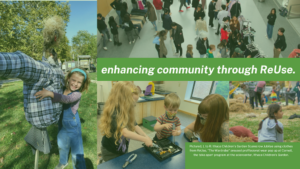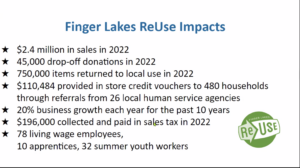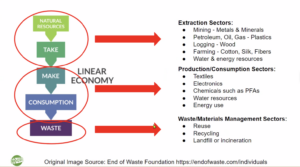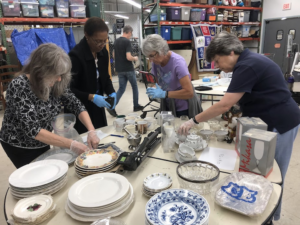by Ariel Miller, ESRAG Newsletter Editor

Collage: Finger Lakes ReUse
How would you feel if you built a charitable organization that has grown to provide 78 living wage jobs, generated $200,000 in sales tax in 2022, and provided over $100,000 a year in in-kind donations to families in need? Most of it from selling stuff that otherwise may have ended up in a landfill? And what if it equipped scores of people every year to rejoin or enter the workforce – people who society too often throws away?
That’s the story of Finger Lakes ReUse, the multi-faceted social enterprise led by Rotarian Diane Cohen of Ithaca, New York which is turning waste into wealth. Finger Lakes ReUse achieved retail sales of over $2,000 per ton of materials from 2019 through 2022, compared to revenues ranging from $45.83 to $184.63 per ton for recycled commodities in the Northeast United States over the same time period.

Finger Lakes ReUse economic impact
Finger Lakes ReUse diverted almost 10 million tons of solid waste from Tompkins County’s landfill from 2018 to 2022. Every year its ReSET (Skills and Employment Training) apprenticeships help people with huge barriers – refugees learning to work in an entirely new culture, citizens returning from prison, and people in recovery from addiction – to build skills and resumes so they can move into living-wage jobs. Youth also benefit from summer internships at Finger Lakes ReUse.
Cohen reports that New York State and Tompkins County are now building a circular economy into their solid waste plans, recognizing re-use as an environmental priority, a stimulus to local economies and an excellent way to save taxpayers money. For contrast, in a summer, 2023 interview with ESRAG, recycling expert John Perry, a Rotarian from Ft. Lauderdale, Florida, outlined American cities’ growing struggle to sustain municipal recycling as rising transport and processing costs often exceed the revenue they can earn for selling recovered commodities.

Cost of linear economy. Credit: End of Waste Foundation
ReUse is also an outstanding climate solution. Linear economies consume scarce resources and generate greenhouse gas emissions and other pollution at every stage: extraction, production, consumption, and waste management. By contrast, ReUse keeps household furnishings, electronics, textiles, and salvaged building materials local and intact, and efficiently gets them to people who need them.
Cohen described how the economic and social benefits of re-use have grown enormously in Ithaca since the opening of Finger Lakes ReUse’s first community ReUse Center in a strip mall in 2008. The business now has triple the space with centers in two locations, and has been growing an average of 20% annually for the past ten years. “It’s an excellent use of empty mall space!” she says.
Here’s an overview of the multiple businesses and community services provided by Finger Lakes ReUse:
- ReUse Centers: retailing furniture, household goods, clothes, shoes, books, electronics, and salvaged building materials
- ReSET Job Training focused on people who have experienced barriers to employment
- Ithaca Fixers Collaborative: volunteers repairing all kinds of consumer goods
- eCenter computer and electronics refurbishment, resale, and training
- ReMAP Store credit vouchers provided to more than 700 households so far this year who are referred by local social service agencies to choose items they need.
The ReMAP (Materials Access Program) illustrates how Finger Lakes ReUse leverages many resources. It’s funded by a grant from the New York State Department of Environmental Conservation’s Environmental Justice Grant Program as well as donations and an in-kind match by Finger Lakes ReUse.

Members of Ithaca Rotary Club sorting donations.
Finger Lakes ReUse offers multiple opportunities for volunteers as well as providing well-paid jobs. The Ithaca Rotary Club is now sorting donated items for the ReUse and earning a little money for Club projects.
The success of Finger Lakes ReUse is garnering increasing interest and excitement, for example in Cornell University’s architecture department, where the goal of designing buildings so they can be taken apart and the components reused is now picking up momentum. Enjoy a glimpse of the potential of designing for deconstruction in this video of how Cornell and Finger Lakes ReUse collaborated on demolishing a house carefully to recover and reuse as much as possible.
In discussions with the State of New York and Cornell, “The attitude toward circular economy and reuse has gone from ‘that’s so nice’ to passionate and engaged interest,” Cohen reports. “Re-use is inclusive: popular across the political spectrum. We are building hope by helping to heal the earth.”